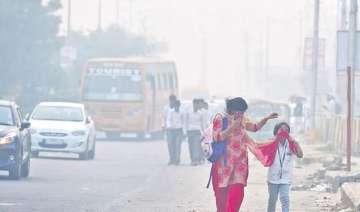Air pollution causes irreversible damage; children reporting problems in brain, lung, heart: Experts
The air quality in Delhi continues to remain in the 'severe' category with the AQI standing at 436, said the System of Air Quality and Weather Forecasting And Research (SAFAR) on Sunday.

Air pollution triggers serious health problems in children and causes irreparable and irreversible damage, Dr Arvind Kumar, the Chairman of Institute of Chest Surgery at Medanta Hospital in Gurugram said on Sunday. His statement comes in wake of deteriorating air quality in Delhi-NCR post Diwali. The air quality in the national capital is now in the 'severe' category.
There is smog in the air and it will continue till January, Dr. Kumar said.
Speaking further, Kumar, citing the "Lung Care Foundation" study, said, "More than 50 per cent of adolescents in Delhi have a higher incidence of chest symptoms, 29 per cent have asthma, 40 per cent are obese (200 per cent higher incidence of asthma). Children are suffering."
"We have found that the children are coming with chest problems. They complain of having breathing problems. In short, air pollution is adversely affecting them," the doctor said.
Further, Kumar said that children are also suffering from problems in the brain, lung, heart, and other organs due to pollution.
Talking about air pollution and the measures that the government undertook to tackle it, Kumar said, "Installing a smog tower is a colossal waste of public money and a grave mistake. The answer lies in preventing the air from getting polluted."
"Pollution has killed more people than COVID but it has not been given the kind of attention it deserves," Kumar added. Kumar also said that some drastic steps need to be taken to control pollution. "Stubble burning is one of the major areas that should be prioritised," he said.
The air quality in Delhi continues to remain in the 'severe' category with the AQI standing at 436, said the System of Air Quality and Weather Forecasting And Research (SAFAR) on Sunday.
The pollution level in the National Capital Region (NCR), namely Noida and Gurugram, was also worrisome. Noida reported AQI in the 'hazardous' category at 575, while the air quality in Gurugram was at the upper end of the 'severe' category at 478.
Ashok Patel, Founder & CEO, Max Ventilator, said that while one can develop some respiratory disorders due to unavoidable reasons, taking lightly of seemingly minor issues with respiratory system can prove to be costly in the long run. He said that from respiratory allergies due to increased pollution to asthma to infections leading to pneumonia and bronchitis to extremely serious conditions such as lung cancer and COPD (a major respiratory disease known to be the second most common cause of death after heart disease in the country) and acute respiratory failure, the list is rather long and many of which would require immediate care and mechanical ventilation.
He said that the ability to breathe normally and continuously through our respiratory organs constitutes an inextricable part of our very living. Any disruption, for whatever reasons, calls for immediate medical attention and care. Patel said that since due to increased pollution post-Diwali several people are facing breathing issues and respiratory problems, this is an opportune time to underline the need to take good care of respiratory organs. He said that poor care of respiratory organs leads to increased use of ventilators. At present, nearly 1.71 lakh Covid patients alone are on ventilators in the country and if combined with other serious respiratory patients this number could rise much higher.
Dr Rajesh G Gajara, MD (Medicine), Consultant Physician and Cardiologist, Fortis, Mulund, said that people often tend to take most of the respiratory organs for granted as long as they are functioning externally not realising that the slightest issue with any one of the organs if not attended to timely could deteriorate into a debilitating disease for life requiring prolonged or even lifelong advanced level of medical attention including ventilatory assistance.
"Remember, COPD, a major respiratory condition has been the second most common cause of mortality after heart disease in the country. It becomes imperative to educate people on the need to take proper care of their respiratory organs regularly which would to a great extent forestall any respiratory emergency obviating the need for ventilator support,” Gajara said.
Also Read | People with chronic diseases, children vulnerable to air pollution: Dr Naresh Trehan